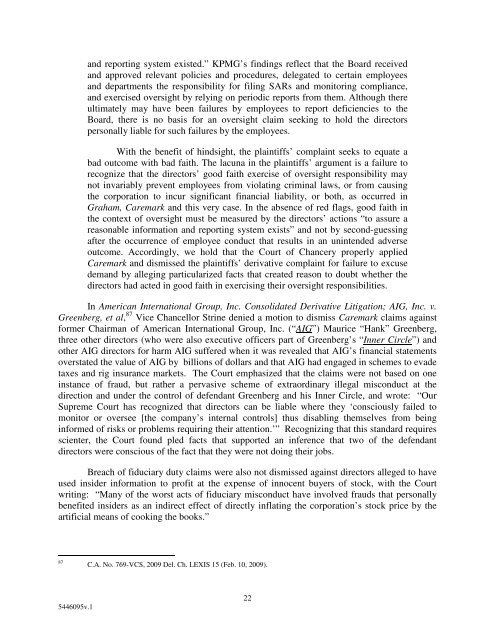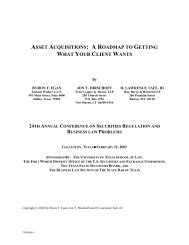fiduciary duty issues in m&a transactions - Jackson Walker LLP
fiduciary duty issues in m&a transactions - Jackson Walker LLP
fiduciary duty issues in m&a transactions - Jackson Walker LLP
You also want an ePaper? Increase the reach of your titles
YUMPU automatically turns print PDFs into web optimized ePapers that Google loves.
and report<strong>in</strong>g system existed.” KPMG’s f<strong>in</strong>d<strong>in</strong>gs reflect that the Board receivedand approved relevant policies and procedures, delegated to certa<strong>in</strong> employeesand departments the responsibility for fil<strong>in</strong>g SARs and monitor<strong>in</strong>g compliance,and exercised oversight by rely<strong>in</strong>g on periodic reports from them. Although thereultimately may have been failures by employees to report deficiencies to theBoard, there is no basis for an oversight claim seek<strong>in</strong>g to hold the directorspersonally liable for such failures by the employees.With the benefit of h<strong>in</strong>dsight, the pla<strong>in</strong>tiffs’ compla<strong>in</strong>t seeks to equate abad outcome with bad faith. The lacuna <strong>in</strong> the pla<strong>in</strong>tiffs’ argument is a failure torecognize that the directors’ good faith exercise of oversight responsibility maynot <strong>in</strong>variably prevent employees from violat<strong>in</strong>g crim<strong>in</strong>al laws, or from caus<strong>in</strong>gthe corporation to <strong>in</strong>cur significant f<strong>in</strong>ancial liability, or both, as occurred <strong>in</strong>Graham, Caremark and this very case. In the absence of red flags, good faith <strong>in</strong>the context of oversight must be measured by the directors’ actions “to assure areasonable <strong>in</strong>formation and report<strong>in</strong>g system exists” and not by second-guess<strong>in</strong>gafter the occurrence of employee conduct that results <strong>in</strong> an un<strong>in</strong>tended adverseoutcome. Accord<strong>in</strong>gly, we hold that the Court of Chancery properly appliedCaremark and dismissed the pla<strong>in</strong>tiffs’ derivative compla<strong>in</strong>t for failure to excusedemand by alleg<strong>in</strong>g particularized facts that created reason to doubt whether thedirectors had acted <strong>in</strong> good faith <strong>in</strong> exercis<strong>in</strong>g their oversight responsibilities.In American International Group, Inc. Consolidated Derivative Litigation; AIG, Inc. v.Greenberg, et al, 87 Vice Chancellor Str<strong>in</strong>e denied a motion to dismiss Caremark claims aga<strong>in</strong>stformer Chairman of American International Group, Inc. (“AIG”) Maurice “Hank” Greenberg,three other directors (who were also executive officers part of Greenberg’s “Inner Circle”) andother AIG directors for harm AIG suffered when it was revealed that AIG’s f<strong>in</strong>ancial statementsoverstated the value of AIG by billions of dollars and that AIG had engaged <strong>in</strong> schemes to evadetaxes and rig <strong>in</strong>surance markets. The Court emphasized that the claims were not based on one<strong>in</strong>stance of fraud, but rather a pervasive scheme of extraord<strong>in</strong>ary illegal misconduct at thedirection and under the control of defendant Greenberg and his Inner Circle, and wrote: “OurSupreme Court has recognized that directors can be liable where they ‘consciously failed tomonitor or oversee [the company’s <strong>in</strong>ternal controls] thus disabl<strong>in</strong>g themselves from be<strong>in</strong>g<strong>in</strong>formed of risks or problems requir<strong>in</strong>g their attention.’” Recogniz<strong>in</strong>g that this standard requiresscienter, the Court found pled facts that supported an <strong>in</strong>ference that two of the defendantdirectors were conscious of the fact that they were not do<strong>in</strong>g their jobs.Breach of <strong>fiduciary</strong> <strong>duty</strong> claims were also not dismissed aga<strong>in</strong>st directors alleged to haveused <strong>in</strong>sider <strong>in</strong>formation to profit at the expense of <strong>in</strong>nocent buyers of stock, with the Courtwrit<strong>in</strong>g: “Many of the worst acts of <strong>fiduciary</strong> misconduct have <strong>in</strong>volved frauds that personallybenefited <strong>in</strong>siders as an <strong>in</strong>direct effect of directly <strong>in</strong>flat<strong>in</strong>g the corporation’s stock price by theartificial means of cook<strong>in</strong>g the books.”87C.A. No. 769-VCS, 2009 Del. Ch. LEXIS 15 (Feb. 10, 2009).5446095v.122
















